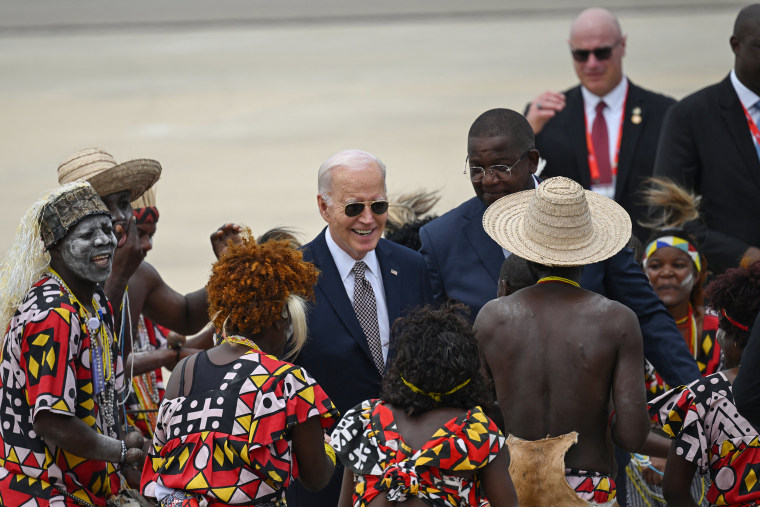LUANDA, Angola — From a hillside overlooking the Bay of Corimba, President Joe Biden declared: “The future runs through Angola, through Africa.”
Biden made the comment on Tuesday as he delivered a speech from Angola’s National Museum of Slavery in Luanda. He stood in the shadow of the complex’s former chapel where Africans were forced into Christian baptism before being loaded onto ships to become part of the transatlantic slave trade. It’s believed that the first enslaved Africans to reach the 13 British colonies in 1619 were from what is now Angola.
Biden referred to the slave trade as the United States’ original sin, explaining to a crowd of Angolan diplomats and young leaders as well as American descendants of enslaved Africans that “to fully consider how far our two countries have come in our friendship, we have to remember how we began.”
The president acknowledged that despite being in the final weeks of his presidency, he wanted to visit Angola to see firsthand how the connection between the two countries has changed dramatically in 400 years. It’s the first time an American president has visited Angola.
On the final day of his three-day trip, Biden traveled Wednesday to the port town of Lobito to hold a summit with leaders from Angola, Zambia, Tanzania and the Democratic Republic of Congo. The leaders toured the port as the White House announced $600 million in new financing for the Lobito corridor.
The Lobito corridor rail and infrastructure project has been the centerpiece of the Biden administration’s efforts in Africa. The White House says the U.S. has invested more than $4 billion in the effort during Biden’s time in office. The money has helped rebuild the rail line that transports food and high-demand minerals like cobalt and copper from Congo and Zambia to the port of Lobito for sale in global markets.
Biden repeatedly noted throughout the trip that the project is cutting the time to get goods to ports from 45 days to roughly 45 hours. Eventually, a senior administration official said, that would lead to global production increases and cost reductions for things like chips, batteries and electric vehicles. “It’s a game-changer,” Biden said.
As Biden toured a massive American-made cargo locomotive at the port, the White House also announced an additional $553 million direct loan from the U.S. International Development Finance Corporation to the Lobito Atlantic Railway. The money is earmarked specifically for upgrades to and the operation of an 800-mile rail line from the port to the DRC border.
“The more you succeed, the more we succeed, the more the world succeeds,” Biden told Angolan president João Lourenço during their meeting at the presidential palace.
The president’s trip comes as the African continent experiences a boom in foreign interest. China has been significantly ramping up its investment in African companies and resources in the last decade or so with a focus on accessing mineral-rich locations like the DRC.

Biden indirectly criticized the way China has done business, during his speech saying, “in too many places, 10 years after the so-called investment was made, workers were still coming home on a dirt road and without electricity. A village without a school, a city without a hospital, a country under crushing debt,” the president said during his museum speech. “We seek a better way. Transparent, high-standard, open-access investment to protect workers and the rule of law and the environment.”
A senior administration official told the press before Biden’s trip that the U.S. is not trying to replace China, but rather present itself, along with other Western countries, as a better alternative.
“This isn’t a race with another country,” John Kirby, White House national security spokesman, said in an interview with NBC News in Luanda. He said the U.S. wants to provide tangible and transparent investment opportunities in Africa “so that countries that have been racked by debt or having involved themselves in financing from other places with high interest rates, now can absolve themselves of that debt.”
During his speech at the slavery museum, Biden said he committed to delivering $55 million in new investment across Africa between 2022 and 2025. So far, the administration delivered about $40 million dollars. And as part of the financial announcements Biden made before leaving Angola on Wednesday afternoon, the U.S. is providing a $229,000 grant to Angola’s slavery museum for restoration and conservation.
Biden said the shared history of Angola and the United States is a lesson for the world. “It’s testament to the human capacity for reconciliation and proof that from even the horrors of slavery and war, there is a way forward.”

